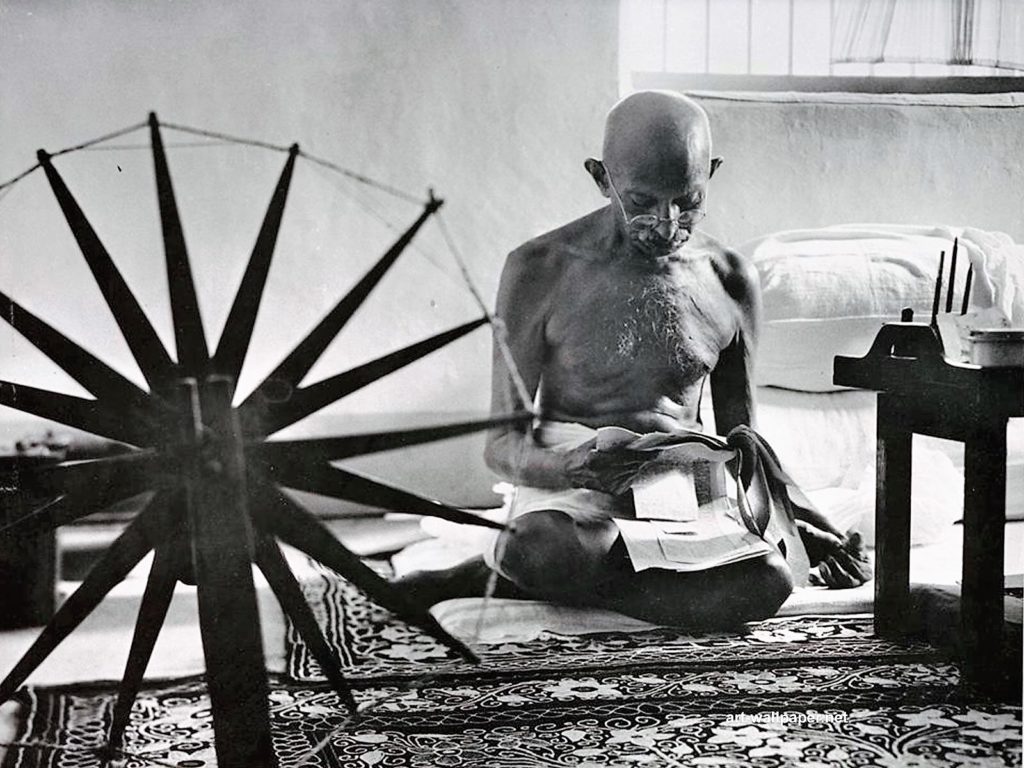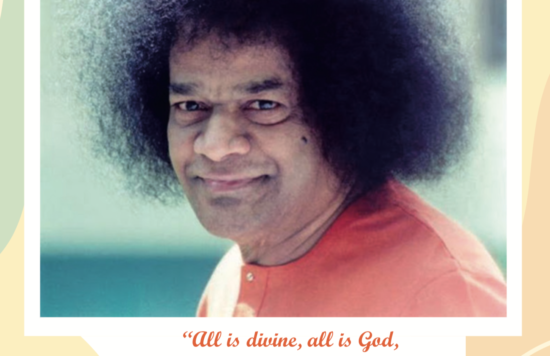Gandhi’s Legacy – Essay by Navya Baradi of Sri Sathya Sai Baba Centre of Edmonton
- Images
| My name is Navya Baradi, I am in Grade 12 and in Group Four at the Sri Sathya Sai Baba Centre of Edmonton. This day, January 30th, marks 70 years since Mohandas Karamchand Gandhi passed away and today we take time to remember the man who we refer to as Mahatma – the great soul, his life, and his message. In recent times, one of his most famous quotations “The earth provides enough to satisfy every man’s need, but not every man’s greed” has gained utmost importance.
Currently, we live in a world where we are driven by the need to consume goods, accumulate wealth, and live a life of abundance. As humans, there is a fundamental need to be resourceful, yet it easily crosses the line between helping ourselves and hurting the earth. Gandhi was a living example of simplicity and demonstrated that he was able to change the fate of a nation while leaving nothing behind but a watch, spectacles, an eating bowl, and sandals. But it is easy to eulogize him as the symbol of simple living and cease to make the effort to lead a life of simplicity which is why it is important to remember his roots.
He was born into a prosperous and well-respected family and had a privileged childhood. And although he himself wanted to be a doctor, his parents supported him in a career of law by sending him to study law at University College London. Upon his graduation, he was offered a job in South Africa. Never having faced immense difficulty growing up, he was shocked by the racial discrimination he faced. This led him to being an activist in South Africa- protesting for proper treatment of Indian people.
Once he returned back to India, initially he tried to be uninvolved in politics but ultimately could not stop himself from standing up for Indian rights when the colonial government was attempting to suppress Indian human rights in the legal system. This began a life of being the most revolutionary freedom fighter in the world with the most powerful weapon, ahimsa- nonviolence.
Using this he was able to peacefully revolt against the injustices that the British Raj condoned. He is considered the Father of India because of the non-cooperation movement – when Gandhi set the goal of self-governance, the Salt March- when he consciously broke the law regarding the salt tax and lead masses to create their own salt, and his involvement in the Quit India movement in the final attempts of ridding India of the British Raj.
The remarkable thing about Mahatma Gandhi, though, is that he was able to accomplish all this while living a life of utmost simplicity. He exemplified the idea of living based on need and not greed. He came to this realization when he renounced the western lifestyle he lived while working in South Africa and gave up western clothes and products as he saw them as a symbol of unnecessary wealth. His selflessness and consciousness of the needs of others were the basis of his lifestyle. He wanted to be accepted by even the poorest person in India and believed that by doing this he was “reducing himself to zero”. This display of humility and selflessness did not make him less respected nor did it make him lose credibility, in fact, it increased the level to which we all revere him now.
In his fight for independence, all he wore was a simple cloth he spun himself, yet he was the world’s most powerful leader without a weapon. From Gandhi we are able to see that strength comes from wisdom amongst many other lessons. His message of simple living is the legacy he left behind. Through minimal material wealth, clean eating, simple clothing, meditation, and letting actions speak for themselves, he proved that it was possible to live a minimalist life even if you are used to luxurious comforts in your daily life.
But this does mean that the only way to carry on his legacy is to give up all your material possessions and live at the most basic level of survival. One of the biggest steps to a life of minimalism is ceiling on desires this means exercising control over your desires: whether it be by saving money from eating out and donating the money to the Food Bank instead, cutting down on water and electricity usage, or even spending time wisely. For the past 12 years I have been attending SSE classes at the Sai Center where I’ve learned fundamental skills to help my own attempts at ceiling on desires. One of the most important principles that I continually refer to in my daily life is the concept of WATCH. As each letter of the word corresponds to an aspect of your life to monitor, it becomes increasingly easier to keep an eye on various parts of your life. Because when you watch your words, actions, thoughts, character, and heart, it is inevitable that you become a more public-spirited person who is conscious of the effects your actions have. If you remember this short acronym, it will be easier to keep in mind what in your words, actions, thoughts, character, and heart, are needs or merely wants. Based on this we, as a community, can develop a loving, selfless, and compassionate world.
By practicing WATCH to place a ceiling on your desires, the goal of emulating aspects of Gandhi’s teachings in your own life becomes an achievable goal. So, on this day that we reminisce about the man, his life, and his message, reflect also on your own life and think about where you can minimize to be conscious of others’ needs and remember Gandhi’s words that “The earth provides enough to satisfy every man’s need, but not every man’s greed.” |





